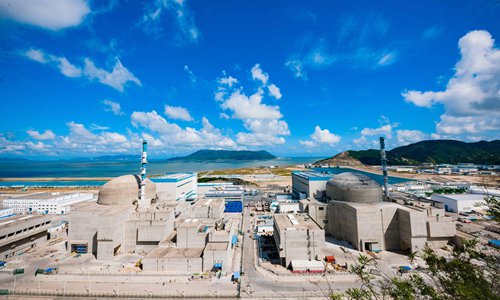
Unit 1 of the Taishan nuclear power plant begins commercial operations on December 13. Photo: VCG
All indicators of the Taishan Nuclear Power Plant in Taishan, South China's Guangdong Province and its surrounding environment are normal, according to continued monitoring data, the China General Nuclear Power Corporation (CGN), the operator of the plant, said in a statement sent to the Global Times on Monday, refuting reports of an alleged fission gas leak at the plant.
Since going into commercial operation, the Taishan Nuclear Power Plant, which is located in Chixi town, has operated the reactors strictly in compliance with business license documents and technical procedures, CGN said in the statement. All the two reactors' operation indicators have been in line with nuclear safety regulations and the technical requirements of electricity plants.
The Chinese nuclear giant made the clarification after a CNN report said on Monday that the US government is assessing a report of a leak at the Taishan Nuclear Power Plant, a joint venture between French energy giant Électricité de France (EDF) and China General Nuclear Power Group (CGN), after Framatome, a subsidiary of EDF warned of an "imminent radiological threat."
Framatome reached out to the US Department of Energy late May and informed the US agency of a "potential issue" at the Taishan plant, CNN said. The company later submitted an operational safety assistance request to the US agency on June 3, in which it warned that the nuclear reactor is leaking fission gas.
Framatome also claimed that Chinese authority was raising the limits for radiation around the plant in order to keep it running, the report said.
On Monday, Framatome told AFP that "the plant is currently operating within the safety parameters," based on the data available. It said it is "supporting resolution of a performance issue" at the plant.
Lin Boqiang, director of the China Center for Energy Economics Research at Xiamen University, told the Global Times that China's third generation nuclear reactors, represented by the Taishan nuclear power plant and the Hualong One technology, have higher safety standards compared with second generation reactors like most currently in use in Europe and the US.
He also said that with the Chinese government's focus on nuclear development, it would be "fatal" for any developers that don't carefully implement the country's nuclear safety standards.
According to the CGN statement to Global Times, the Taishan Nuclear Power plant currently consists of two 1,750-megawatt Evolutionary Power Reactors (EPRs) that were jointly invested, constructed and operated by CGN and the EDF Group. One of the reactors had entered into commercial operation in December 2018, while the second one started commercial operation in September 2019.
The statement also added that the second EPR reactor at the Taishan Nuclear Power Plant had completed an overhaul as planned. All safety, quality and project period indicators of the overhaul have fulfilled their set goals.
Currently, CGN holds a 70 percent stake in the Taishan Nuclear Power Joint Venture Co, while the rest is held by EDF.




